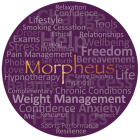Exam and Driving Test Nerves
word definitions taken from Wikipedia
A test or an examination (or “exam”) is an assessment intended to measure a test-taker’s knowledge, skill, aptitude, physical fitness, or classification in many other topics (e.g., beliefs).
A test may be administered orally, on paper, on a computer, or in a confined area that requires a test taker to physically perform a set of skills. Tests vary in style, rigour and requirements. For example, in a closed book test, a test taker is often required to rely upon memory to respond to specific items whereas in an open book test, a test taker may use one or more supplementary tools such as a reference book or calculator when responding to an item. A test may be administered formally or informally. An example of an informal test would be a reading test administered by a parent to a child. An example of a formal test would be a final examination administered by a teacher in a classroom or an I.Q. test administered by a psychologist in a clinic. Formal testing often results in a grade or a test score. A test score may be interpreted with regards to a norm or criterion, or occasionally both. The norm may be established independently, or by statistical analysis of a large number of participants.
Exam nerves are a healthy sign that you taking things seriously and want all your hard work leading up to the exam to be recognised.
Almost everyone feels nervous before an exam. Butterflies in the stomach and worrying thoughts – ‘Will I be able to answer the questions?’ ‘Have I done enough revision?’ – are indications of exam nerves that are probably familiar to all students. In fact, a certain amount of nervous tension probably helps us perform to the best of our ability, producing a rush of adrenaline that helps us to feel alert and focused. However, too much anxiety can BLOCK thoughts, create a negative frame of mind, and lead to panic and potentially poor exam performance.
There are a number of things you can do to help manage exam anxiety and turn uncomfortable, panicky thoughts into more creative tension…
How can Morpheus Associates help?
Hypnotherapy is used successfully to help people deal with a wide range of conditions. It is widely recognised now in its success with helping people with relaxation, and techniques are used to help people manage stress and anxiety associated with many other conditions. The client normally awakes feeling re energised and revitalised, with new hope and a positive frame of mind.
We offer an Initial 15-20 minute consultation which is free. At the end of this consultation you will be asked if you wish to proceed. At which point we will explain the fees per session, relevant to the treatment recommended and how many sessions are suggested as being required. We are located at Clarice House in Ipswich, The Heritage Centre Bury St Edmunds, Clarice House Colchester and Harley Street London. If a course of treatment is recommended, subsequent sessions are offered at a discounted price. Payments are accepted by cash or cheque with guarantee card only.
Please feel free to read our recent testimonials (link) from clients who have had this condition treated by Morpheus Associates
If you are comfortable with the idea, please call us to book an Initial 15-20 minute consultation, at which time you can decide if you feel the treatment offered would possibly help. Call Debbie Crooks on 07840-694743.
Contact me today
Please fill out this form and I will get in touch with you shortly.

